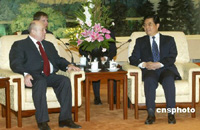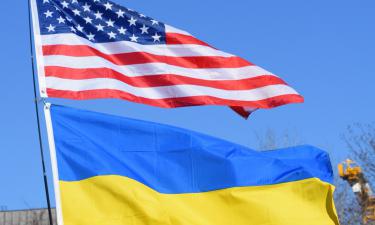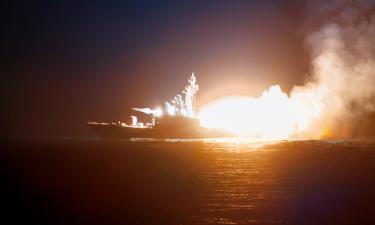Russia and China seek closer oil cooperation
Russia and China pledged Wednesday to cooperate more closely in producing oil and gas, and the Russian president vowed to go forward with a much-anticipated pipeline to carry Siberian oil to fuel China 's booming economy. However, Russian President Vladimir Putin announced no details of the oil pipeline or its timing after meeting in Beijing with his Chinese counterpart Hu Jintao for the fifth time in less than a year.

Putin had promised on Tuesday to expand Russian energy supplies to China by opening a natural gas pipeline network within five years. But there was no word on the oil pipeline that also is eagerly sought by Beijing . Russian officials have said that a feasibility study must be finished before those plans are finalized.
Also Wednesday, the head of Russian oil company OAO Rosneft said it would launch joint ventures with China 's leading oil firm to produce Russian crude and operate filling stations in China . "We should see various ways to cooperate in energy and resources," Hu said at the opening of a Russian-Chinese business forum. "We should work hard on the exploration of energy, such as oil and gas."
China is lobbying for access to Russian oil and gas amid a worldwide scramble to secure energy for its sizzling economy, which the government says should grow by 8 percent this year. A key project is the planned 4,100-kilometer (2,550-mile) Siberian pipeline to the Pacific coast that drew heavy lobbying from both China and Japan for the most favorable routing.
Russia 's Cabinet in 2003 decided against a pipeline going directly into China as Beijing sought planning instead on a route to its own Pacific coast. But Moscow has signalled its intention to build a branch into China . Putin gave no details or timetable for that project during his visit to Beijing , but pledged his country's commitment to the plan.
"If this project is successfully completed and that is beyond doubt it will provide for significant increase in the volume of oil supplies from Russia to China ," Putin said at the business forum.
The Russian energy minister said that Moscow and China would conduct a feasibility study and that a construction timetable could not be proposed until the study is done. Russian officials tried to put a positive spin on the lack of a final deal for the oil pipeline, casting the feasibility study as a genuine step forward.
"This project has long been discussed and I repeat that this year, in the very near future, it will begin to be realized," Foreign Minister Sergey Lavrov said.
The chief executive of OAO Rosneft, Sergei Bogdanchikov, said the company will launch ventures this year with state-owned China National Petroleum Corp. to extract and refine Russian crude and to operate filling stations in China . Bogdanchikov, speaking to reporters at the business forum, didn't give any other details about the ventures.
Both governments also have used the trip to promote what they call their strategic partnership. They have underscored shared positions to international disputes such as Iran and North Korea 's nuclear programs and made passing swipes at what they see is U.S. dominance in global affairs.
In the U.N. Security Council, Russia and China both permanent members with veto power are holding out from toughening positions on Iran and its compliance with the demands of the International Atomic Energy Agency. "We share a common view on most international issues ... to use multilateral cooperation to reach agreements that all parties can accept," Lavrov said. "And not to push some issue or other onto the agenda of the day just for political reasons." Putin, a black belt in judo, planned to fly later to Shaolin, the Chinese town regarded as the birthplace of the martial art kung fu, before returning to Moscow , reports the AP.
N.U.
Subscribe to Pravda.Ru Telegram channel, Facebook, RSS!




